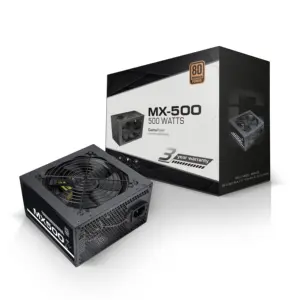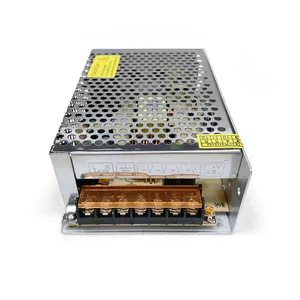What are PC Power Supplies
PC power supplies, also known as power supply units (PSUs), are a critical component in computer systems, providing the necessary electrical power to run all the internal hardware. They convert the alternating current (AC) from a wall outlet into a continuous form of power that the computer’s components can use, direct current (DC). The reliability and stability of a system largely depend on the quality of its power supply, as it ensures the delivery of consistent power to the motherboard, hard drives, graphics cards, and other peripherals.
Power supplies come in different wattages and efficiency ratings, and they must match the power demands of the system. They are equipped with various connectors to fit the multitude of components within a PC. For example, a motherboard generally requires a 24-pin connector, while graphics cards may need one or more 6- or 8-pin connectors. Additionally, modern power supplies often include features such as overcurrent protection and short circuit protection to safeguard against potential electrical hazards.
The core principle behind a PC power supply is simple: it takes AC power from the wall, which can vary in voltage and current, and converts it into DC power at specific voltages that electronic components need to operate safely and effectively. This process involves rectification to change AC to DC, filtering to smooth out fluctuations in the current, and regulation to maintain a constant voltage despite changes in load conditions. PC power supplies are designed for different users ranging from casual home users to high-demand gamers and professional workstations that require robust and reliable power delivery for intensive tasks.
Types of PC Power Supplies
PC power supplies are categorized based on various specifications and features that cater to different use cases. Here is an overview of some common types:
Standard ATX Power Supplies: These are the most common form factor for desktop PCs. They come with a 24-pin motherboard connector and various other connectors for different components. They are widely used due to their compatibility with most desktop cases and motherboards.
SFX Power Supplies: These are smaller than ATX power supplies and are typically used in mini-ITX cases or compact gaming systems. Despite their size, they can still pack enough power for most small form factor builds.
TFX Power Supplies: These are even slimmer than SFX units and are often found in slim desktop computers or media center PCs. Their compact design allows them to fit into tighter spaces but may offer less wattage compared to their larger counterparts.
Flex ATX Power Supplies: These are designed for microservers or other small footprint industrial applications. They provide reliable power in a compact size, making them suitable for specialized environments where space is at a premium.
Redundant Power Supplies: Commonly used in servers or mission-critical systems, redundant power supplies consist of two or more units working in parallel. This provides added reliability because if one unit fails, the others can continue to provide uninterrupted power.
How to choose PC Power Supplies
Choosing the right PC power supply for your business involves several important considerations. The type of power supply should align with the specific needs of your applications—whether it's for standard office desktops, compact media centers, or high-performance gaming rigs. Firstly, you need to determine the form factor that is compatible with your computer cases; ATX is standard but SFX or TFX might be required for smaller builds.
The wattage rating is crucial as it needs to meet or exceed the total power demand of all components combined. A PSU with higher wattage than required offers room for future upgrades but should be balanced against cost-effectiveness for bulk purchasing. Efficiency ratings such as 80 Plus Bronze, Silver, Gold, etc., indicate how well a PSU converts AC to DC at different loads; higher efficiency can lead to energy savings which is beneficial for businesses aiming to reduce operational costs.
Protection features like overcurrent protection and short circuit protection are non-negotiable for safeguarding your investments against electrical anomalies. Cooling is another aspect; larger fans can provide better cooling with less noise which might be important in customer-facing or noise-sensitive environments.
Lastly, when buying through B2B channels like Alibaba.com where bulk purchasing is common, consider supplier reliability and product consistency across large orders. Understanding these factors will help ensure you select PC power supplies that provide stable performance tailored to your business requirements.
Best PC Power Supplies on Alibaba.com
Alibaba.com offers an extensive selection of PC power supplies catering to various business needs around the globe. From robust industrial-grade units designed for demanding environments to efficient models ideal for office use or high-end gaming setups, Alibaba.com's marketplace connects buyers with suppliers offering products that meet diverse requirements without compromising on reliability.
Businesses looking for bulk purchases will find Alibaba's vast network of suppliers an invaluable resource with options ranging from standard ATX supplies to specialized SFX or TFX models. The platform's focus on facilitating international trade ensures that buyers can effortlessly source products from suppliers worldwide while benefiting from services such as Trade Assurance which adds a layer of security by protecting payments until delivery completion.
Alibaba.com's intuitive platform makes it easy for businesses to filter through options based on technical specifications such as wattage, efficiency rating, cooling fan size, input voltage range, protection features offered, output type, material quality, and more. With its commitment to streamlining online B2B trade solutions and its emphasis on quality assurance measures, Alibaba.com stands out as an essential hub for sourcing commercial-grade PC power supplies tailored to specific business needs.
Common FAQs for PC Power Supplies
What is the significance of wattage in a PC power supply?
The wattage of a PC power supply indicates the maximum amount of power it can deliver to the computer's components. Businesses need to choose a PSU with enough wattage to handle their system's power requirements, with some headroom for potential future upgrades.
How does the efficiency rating of a PC power supply affect operational costs?
Efficiency ratings, such as 80 Plus certifications, reflect how effectively a power supply converts AC power to DC. A higher efficiency rating means less energy is wasted, which can lead to reduced electricity costs and lower operational expenses for businesses.
Why is it important to consider the form factor of a PC power supply?
The form factor determines the size and shape of the power supply and its compatibility with different computer cases. Businesses must choose a PSU with the correct form factor to ensure it fits their systems and meets their space constraints.
What are redundant power supplies, and when are they necessary?
Redundant power supplies consist of multiple units that work in parallel, providing increased reliability. They are essential for servers and mission-critical systems where uninterrupted power is critical to maintain operations and prevent data loss.
How do protection features in PC power supplies safeguard computer components?
Protection features like overcurrent, short circuit, overvoltage, and overheating safeguards prevent damage to computer components from electrical anomalies. These features are crucial for businesses to avoid costly downtime and equipment failures.
What role does the cooling fan play in a PC power supply?
The cooling fan in a PC power supply helps dissipate heat generated during operation. A larger fan or one with better design can cool more efficiently and operate more quietly, which may be important in certain business environments.
Can I use a PC power supply with an input voltage that differs from my country's standard outlet voltage?
Most modern PC power supplies support a range of input voltages (e.g., 100-240V) to accommodate different standards worldwide. However, always verify that the PSU you select matches the voltage specifications required for your region.
What is PFC (Power Factor Correction) in PC power supplies, and why is it important?
PFC is a feature that reduces the amount of reactive power produced by a PSU, improving its efficiency and reducing electrical stress on the power grid. It's especially important for businesses that operate multiple computers, as it can result in energy savings at scale.
Why might a business choose a modular power supply over a non-modular one?
Modular power supplies allow for greater flexibility in cable management since you can connect only the cables needed for your build. This can result in better airflow and tidier setups, which is beneficial in systems where space optimization or aesthetics are important.
Can the materials used in PC power supplies impact their performance or durability?
Yes, high-quality materials such as aluminum alloy or fireproof plastics can improve heat dissipation and provide better protection against fire hazards, enhancing both performance and durability of the PSU.
Is it necessary for businesses to have custom cables or connectors for their PC power supplies?
While standard connectors typically satisfy most requirements, custom cables might be necessary for unique builds or specialized systems where standard cable lengths or configurations do not suffice.
How does output type affect the choice of PC power supply for a business?
The output type refers to whether a PSU provides multiple different voltages (multi-rail) or a single voltage (single-rail). The choice depends on the specific needs of the components within the system; multi-rail PSUs offer more targeted distribution of power, while single-rail PSUs simplify setup.












































 浙公网安备 33010002000092号
浙公网安备 33010002000092号 浙B2-20120091-4
浙B2-20120091-4